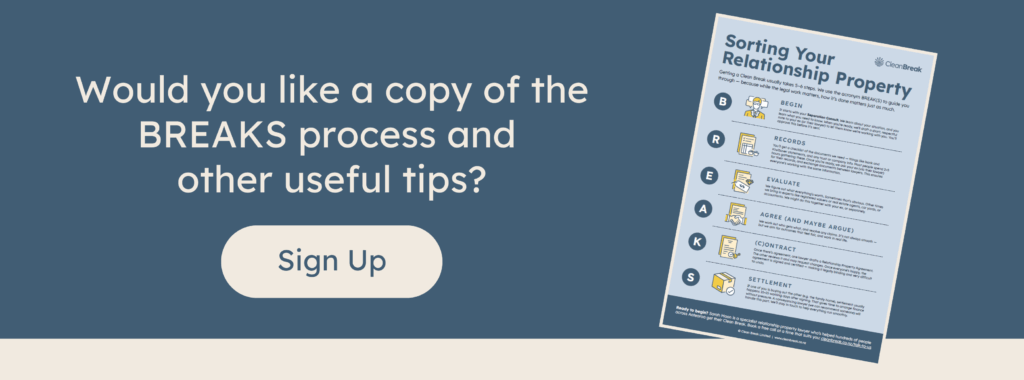What happens when you separate (or divorce) in New Zealand?
Separation is one of life’s biggest curveballs. Alongside the emotions, there’s a long list of “what now?” questions about property, money, kids, and even the paperwork of ending a marriage. If you’re in New Zealand and navigating this, here’s what usually needs to happen.
Dividing Assets
In New Zealand, the Property (Relationships) Act sets the default: after three years of living together (sometimes sooner), most assets and debts are shared 50/50. That includes the family home, cars, KiwiSaver, and often even businesses or trusts. If you want something different, you’ll need to have sorted out a contracting out agreement (sometimes called a pre-nup) before you separated.
For couples separating though, the main task is to create a relationship property agreement. This is the legally binding document that records who gets what. Both partners must get independent legal advice, and the agreement must be certified by lawyers to stick. We talk about the process more below.
Sorting Parenting Arrangements
If you have children, you’ll also need to decide how care will be shared. Most parents agree care arrangements between themselves, either directly or using a funded mediation service called FDR where a third party gives you a hand. If that doesn’t work, either parent can seek a parenting order through the Family Court. The key question the Court will ask is: what’s in the best interests of the children?
Here are two helpful websites:
https://www.fairwayresolution.com/help-for-you/family
https://www.justice.govt.nz/family/care-of-children/
The Divorce
In New Zealand, you can only apply for a divorce (technically called a dissolution of marriage) once you’ve been separated for two years. It’s a separate step from sorting property or childcare and often comes later. Many people finalise their property agreement first, then apply for dissolution when they’re ready.
The good news? This part is easy enough to do yourself through the Ministry of Justice website: apply for a divorce. You can either apply together with your ex, or one person can submit the application and then serve the other. Or if you want us to help, we are happy to assist with this.
The Clean BREAKS Process
At Clean Break, we sort out all the financial stuff in a six-step pathway we call BREAKS:
Begin: It starts with a Separation Consult. We learn about your situation, and you learn what you need to know. When you’re ready, we draft a short, respectful note to your ex (or their lawyer) to confirm we’re working with you.
Records: We give you a checklist of the documents we need (bank and KiwiSaver statements, trust or company info, etc). Once you’ve gathered these, we exchange records with your ex’s lawyer so everyone is working from the same information.
Evaluate: We figure out what everything is worth. Sometimes that’s straightforward; other times we bring in valuers, agents, or accountants to help.
Agree (or maybe argue): This is where negotiation happens. Our goal is outcomes that feel fair and work in real life, even if the path there gets bumpy.
Kontract: Once there’s agreement, one lawyer drafts the Relationship Property Agreement, the other reviews it. Once everyone’s happy it’s signed and certified. From this point, it’s legally binding.
Settlement: If one of you is buying out the other (for example, the family home), settlement usually happens 10–15 working days after signing. A conveyancing (property) lawyer handles this, and we stay in touch to keep things moving smoothly.
Moving Forward
Separation and divorce aren’t just about dividing assets, they’re about creating space for your next chapter. Yes, there’s paperwork. Yes, it can be emotional and messy. But with the right advice, a clear process, and support around you, it becomes manageable.
At Clean Break, we believe understanding your position is the first step toward peace of mind. If you’re facing separation, you don’t have to do it alone.
A Note on Complexity
While the law starts with a presumption of a 50/50 split, not every separation is that simple. If one partner has stayed home to raise children, their future earning capacity may be reduced and the law allows for adjustments to reflect that. Add in trusts, businesses, multiple properties, or complex finances, and things can get messy quickly.
That is why we recommend speaking with a relationship property lawyer as soon as possible, ideally before you even separate. Getting clear advice early can help you avoid costly mistakes, reduce conflict, and make sure your eventual agreement is both fair and legally watertight.



Comments (0)